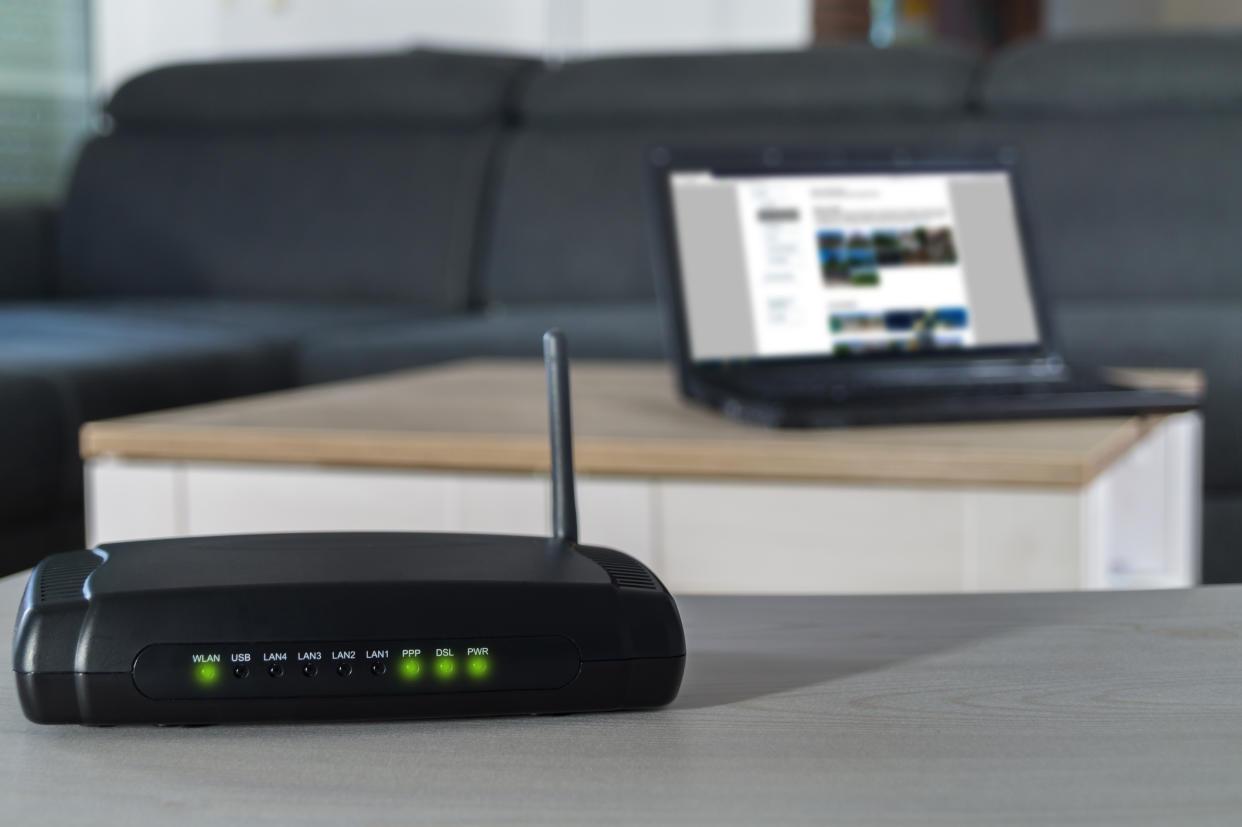Cost of living: How to save money on your internet bill

Internet bills are just one of the areas where many households are looking to reduce spending in order to deal with the cost-of-living crisis.
Internet access is considered a necessity in order to allow people to communicate, with many jobs requiring decent WiFi at home.
However, a report released by Ofcom in February 2022 claimed that 1.1 million households couldn't afford to pay their broadband bill and that millions of people on employment benefits were missing out on potential discounts.
Read more: 'Extraordinary' warning energy bills may go much higher than £3,000
Yahoo News UK looks at ways that you can save money on your internet bill and where you can go to get help if you're struggling.
How do internet bills work?
People get access to the internet in many ways, including through DSL, cable internet connections, mobile network providers, or from broadband providers.
Regardless of the method that you use, you'll receive a monthly bill which includes a fixed monthly charge as stated in your contract, as well as any late fees if the payment was not received on time or penalties for going over the agreed amount if you're using mobile data.
How much you pay for your internet depends on a number of factors, such as which provider you use, where you live, and what broadband speed connection you have.
What is broadband speed?

Broadband speed refers to how quickly data is being transferred and is normally measured in Megabits per second (Mbps).
Standard broadband (also known as ADSL) transfers data the slowest, at around 11mps, while 'fibre broadband' delivers at a much faster rate.
On average, 'superfast fibre' transfers at speeds between 36Mbps and 60Mbps, and 'ultrafast fibre' can transfer quicker than 300Mbps.
According to the research website Cable, 36mbps is usually enough for streaming HD/4K TV, watching films, listening to music, gaming and connecting 6-10 devices at once.
It normally costs around the same amount as the standard broadband speed, so it makes more sense to switch if you're using ADSL currently.
What does your location have to do with internet connection?
Broadband speeds differ depending on region.
The website thinkbroadband.com looked at superfast and full fibre broadband coverage across the UK and found that overall Northern Ireland, London and the West Midlands ranked best, while Wales and the south west had the least coverage.
The government has promised to improve coverage across the whole of the UK as part of its Levelling Up Agenda.
When looking for deals on provider's websites, you're normally asked to enter your postcode first to see if it's available where you live.
Why might your internet bill go up?

Read more: This simple chart shows why 5.6 million families will be hundreds of pounds worse off this year
Many companies use inflation as a justification for increasing their charges.
Usually, an annual bill increase is stated in the terms and conditions of the contract.
However, if your broadband provider increases their prices without warning you first, you're legally allowed to terminate the contract early penalty-free, as long as your contact was taken out after January 2014.
All you have to do is let your provider know you want to leave within 30 days of being notified about the increase.
Still, if you're struggling to keep up with costs, there are a number of steps you can take to try and reduce your monthly bill.
Tips for saving on internet bills

1. Check to see if your contact has ended.
Since 2020, phone, broadband and pay-TV companies have to warn customers at least 10 days before their contract comes to an end.
This was changed was implemented following a report by the industry regulator Ofcom in 2020, which found that around 20 million people were using contracts which had already ended but had automatically renewed.
If you fail to renew, you may be put on a higher monthly rolling rate.
If your contract hasn't ended yet, there's most likely a fee for terminating it early, so you'll have to work out if it's worth paying a fee to switch anyway.
2. Do some research to find the best deals.
Using comparison websites such as BroadbandDeals.co.uk, Money Supermarket and Uswitch allows you to browse through hundreds of contracts to see if you can find a better deal than your current one.
If your broadband service uses an Openreach network, you can switch over without having to tell your current provider as your new one will sort it out for you. Companies that use Openreach include BT, EE, Sky, TalkTalk and Vodafone.
Read more: The poorly paid workers most likely to be denied pay rises

For all other services which don't use Openreach, such as Virgin Media, you'll have to let your current provider know that you're leaving and sign up for a new contract yourself.
If you get your internet as part of a bundle with a pay-TV and/or phone, switching Wi-Fi might also mean cancelling the other services, so you should take this into account.
3. Ask your current provider what they're offering new customers.
Thanks to rules imposed by Ofcom, broadband providers have a duty to let customers know about the best deals available, which includes any prices only available to new customers.
In 2019, the regulator found that out-of-contract customers could have saved around £100 per year on average by negotiating a new deal with their existing provider, while others could have saved over £150.
This excludes additional savings which could be made on TV and phone packages too.
4. Ask your current provider if they can price match another company.
Money Saving Expert Martin Lewis recommends haggling as the best way to get a good deal from your existing provider.
The consumer website has a list of the 'top ten UK services to haggle with', which includes Virgin Media at number four.
Using data from a poll of over 8,000 people who tried to haggle with their providers to get a better deal in 2021, it found that 83% of Virgin Media customers were able to get a better deal by saying that they were considering leaving it for another provider and citing the deals it had on offer for new customers joining the network.
5. Think about reducing your connection speed.
Ultra-fast connections are considerably more expensive than standard and entry-level fibre ones, so you should ask yourself whether you actually need the current speed you have.
MoneySavingExpert.com says that fast fibre is good for people who do lots of streaming, gaming or live in a household with lots of devices.
But, if you're someone who just uses the internet for basic tasks like emailing and occasional browsing, a super-fast connection isn't necessary.
To find out which speed you need, Compare The Market has a useful guide for what each speed is capable of doing.
6. Double-check that you're getting the speed you were promised.
If your internet speed is slower than stated in your contract and the problem isn't fixed within 30 days of reporting it, your broadband provider must offer you the right to terminate your contract early without being charged.
This also applies if your internet was purchased in a bundle with your landline and pay-TV.
7. See if you're eligible for a discount.
Ofcom says that 4.2 million people on Universal Credit could halve their bills by taking advantage of special discounted packages available.
At the moment, BT, Virgin Media, Community Fibre, G.Network, Hyperoptic, and KCOM all offer discounts for people in receipt of this benefit.
For example, BT offers 67mps broadband for just £15 a month for people claiming certain benefits, including Universal Credit, Pension Credit and Jobseeker's Allowance.
All you have to do is give them your National Insurance number so that they can double-check your eligibility.
Watch: Michael Gove defends five year delay in delivering broadband to every UK home


